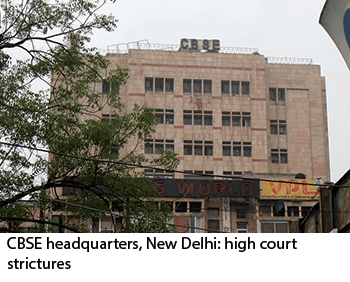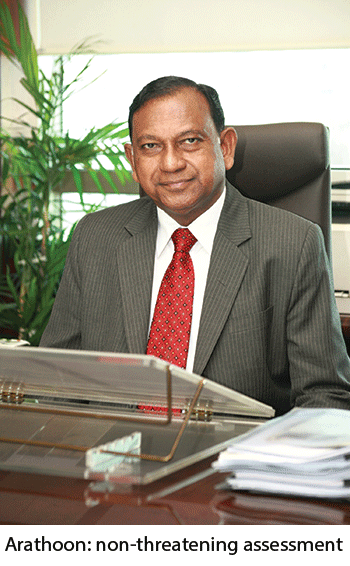 These are bad days for the Delhi-based Central Board of Secondary Education — the country’s largest national school-leaving examinations board which has 18,688 affiliated schools in India and abroad — particularly for its ambitious, authoritarian former bureaucrat R.K. Chaturvedi who was hand-picked and appointed chairman of CBSE for a five-year term on July 14 last year.
These are bad days for the Delhi-based Central Board of Secondary Education — the country’s largest national school-leaving examinations board which has 18,688 affiliated schools in India and abroad — particularly for its ambitious, authoritarian former bureaucrat R.K. Chaturvedi who was hand-picked and appointed chairman of CBSE for a five-year term on July 14 last year.
Last December shortly after he was appointed chairman, CBSE issued two circulars amending its bye-laws to appoint a CBSE nominee (with veto powers) to the selection committees of affiliated schools which recruit headmasters and principals. Following a spate of writ petitions filed protesting dilution of the autonomy of affiliated schools and a cover story in EducationWorld (‘Brewing revolt against control-and-command CBSE’, February 2017), the circulars were put in cold storage.
More recently in Rakesh Kumar & Anr. Vs. Union of India & Ors. (CM No.19732/2017), the Delhi high court in an order dated May 23 pulled up the board for peremptorially scrapping its long-standing moderation policy under which students have traditionally been awarded ‘grace’ marks when question papers are unusually difficult.
And on June 21 while hearing an admission plea in Gaurav Kathuria vs. Central Board of Secondary Education and Anr. (W.P. (C) 5355/2017), the Delhi high court again censured the exam board for peremptorily abolishing its three-year-old re-evaluation policy under which class XII students were entitled to have their papers re-evaluated. Last October, the CBSE management scrapped its re-evaluation policy without notice to affiliated schools, forcing class XII students suspicious of their marks this year to obtain court orders for re-evaluation.
“When there are so many errors in totalling, why should you do away with re-evaluation? You should not have done that. Careers of 2,100 students are at stake. We all know what happens on a fraction of a mark or percentage,” said a two-judge bench (Justices Sanjeev Sachdeva and A.K. Chawla) of the court alluding to the high percentages demanded by undergraduate colleges for admission of class XII school-leavers.
The court’s ire against the CBSE management was undoubtedly prompted by widespread reports of slapdash evaluation of answer papers in the all-important class XII school-leaving examinations and egregious marks totalling errors. According to media reports from across the country, students whose papers were re-evaluated under court orders revealed outrageous discrepancies and errors. The Indian Express, Delhi (June 19) unusually citing a Times of India report, recounts that Delhi-based student Sonali who had averaged 90 percent-plus in all subjects except mathematics (68 percent) was awarded 95 percent after re-evaluation. Likewise, Delhi-based student Samiksha Sharma’s maths marks were revised to 90 from 42. Ditto, the 50 percent awarded to Mumbai-based Mohammed Affan in mathematics revised to 90 percent after verification.
“CBSE is a school-leaving examinations board and its entire focus should be on conducting the class X and XII examinations, and addressing the grievances of students after results are released. However, currently CBSE is overburdened with responsibilities outside its remit and is conducting pre-medical entrance exams, entrance tests for architecture colleges etc — which should be conducted by higher education regulatory bodies. The CBSE management has taken too much on its plate and this is ruining its credibility. It should re-structured with the ambit of its duties restricted to conducting school-leaving examinations,” says Prof. J.S. Rajput, former chairman, National Council of Educational Research and Training and currently a reputed commentator on K-12 education.
Yet at bottom, the prime factor behind expansion of its boundaries and the arbitrary diktats issued by CBSE is that in the new millennium, the board has become the happy hunting ground of generalist IAS bureaucrats with precious little knowledge of the pulls, pressures and pedagogies of contemporary education. Chaturvedi’s IAS predecessor Vineet Joshi’s gift to Indian school education was messing up the continuous and comprehensive evaluation system. Now Chaturvedi is following suit with his arbitrary, ill-considered diktats.
Quite obviously CBSE needs to be headed by experienced educationists rather than overweening bureaucrats.
Swati Roy (Delhi)
Additional burden?
 Already under pressure for having to lug heavy school bags — because the simple solution of providing in-school lockers has simply eluded the majority of K-12 school managements — primary school children are likely to have to endure more pain and grow up fast.
Already under pressure for having to lug heavy school bags — because the simple solution of providing in-school lockers has simply eluded the majority of K-12 school managements — primary school children are likely to have to endure more pain and grow up fast.
On June 7 at a press conference in Kolkata, Gerry Arathoon, CEO and secretary general of the Council for the Indian School Certificate Examinations (CISCE, estb. 1958) which has 2,120 primary-secondary schools countrywide affiliated with it, created a stir by announcing that a quasi-board examination for classes V and VIII will be conducted for all affiliated schools from the next academic year (2018-19). This proposal to impose board exams on 10-13-year-old children has triggered heavy criticism from parents, teachers and education activists.
According to Dr. John Kurrien, director emeritus of the Pune-based Centre for Learning Resources and a well-known child learning expert, this CISCE initiative is “retrograde”. “Already CISCE schools impose more pressure on children compared to CBSE and state government schools. This proposal will double the academic pressure on young pre-teen children and force them to curtail their co-curricular and sports activities. The board imposed diagnostic testing is unnecessary as class V-VIII children are already subjected to evaluation and summative tests and teachers are well aware of their weaknesses and strengths,” says Kurrien.
However, CISCE officials deny that board exams have been mandated for primary school children. Gerry Arathoon says that the media has “misinterpreted” the informal evaluation proposal as board exams. “There is a lot of misconception regarding the assessment proposed by CISCE at class V and VIII levels. This isn’t a board examination. It’s a non-threatening diagnostic assessment unrelated to classroom scores. Hence no preparation or rote learning will be required and there won’t be any grading, ranking, competition or fault-finding of any type,” Arathoon assured your correspondent.
According to child rights activists and educationists, although this proposal doesn’t transgress the umbrella Right of Children to Free & Compulsory Education (aka RTE) Act 2009, it will impose additional stress on young children who already suffer the burden of unrealistic parental expectations. “Under law, no exam is prescribed for children in elementary education. Learning deficits have to be identified on a daily basis for which CCE (continuous and comprehensive evaluation) has been mandated by the RTE Act. Imposing judgemental testing on children at this age is very harsh. As a pedagogist and child rights activist I believe teaching and testing shouldn’t be separated in the primary school years. Advocates of external assessment for primary students, obviously don’t love children,” says Dr. Niranjanaradhya V.P, programme head, universalisation of school education at the National Law School of India University, Bangalore.
Some academics in the national capital believe that the new activism of the hitherto laid-back and liberal CISCE management is because of the widening gap — in terms of affiliated schools — between the government-run Central Board of Secondary Education (CBSE) which has 18,688 affiliated schools countrywide as against CISCE’s 2,120, with an uncomfortable number of greenfield schools choosing to affiliate with CBSE. This circumstance and a race to ensure that students of CISCE schools score high marks in its school-leaving class X ICSE and class XII ISC exams, has prompted the board to ensure uniform high quality teaching-learning in children’s early years.
With the CCE recommendation of the RTE Act dumped by the Union HRD ministry and the National Committee for Protection of Child Rights now defunct, exams and tests for youngest children are the flavour of the season. The question nobody is asking is — when will children enjoy childhood?
Autar Nehru (New Delhi)